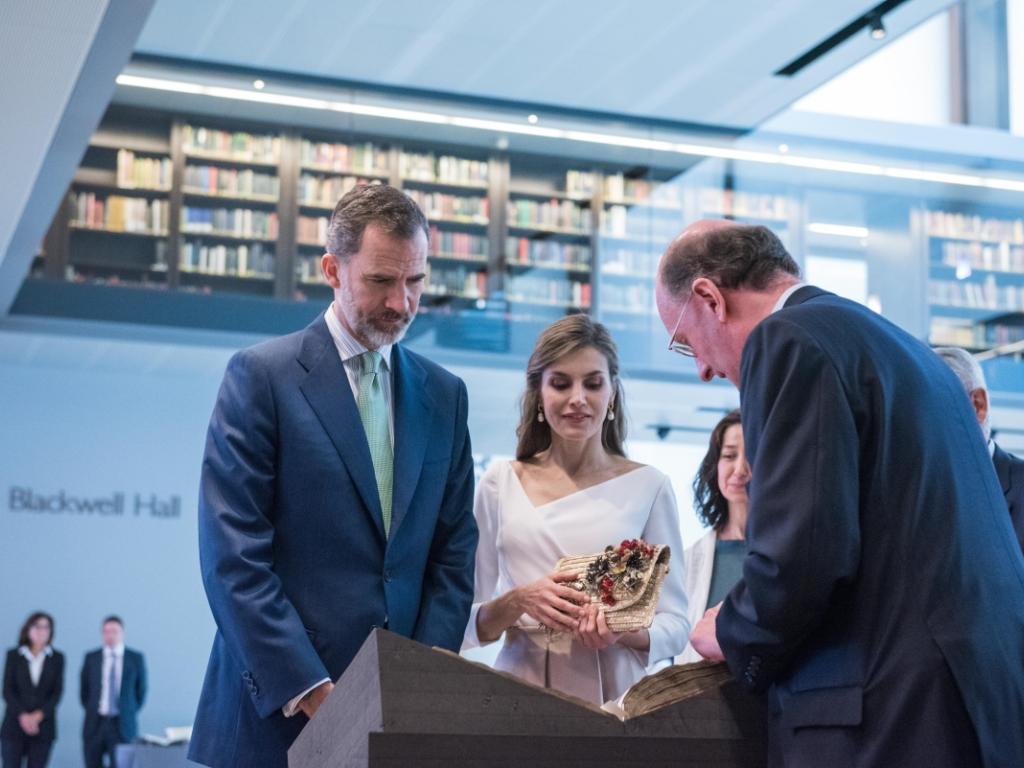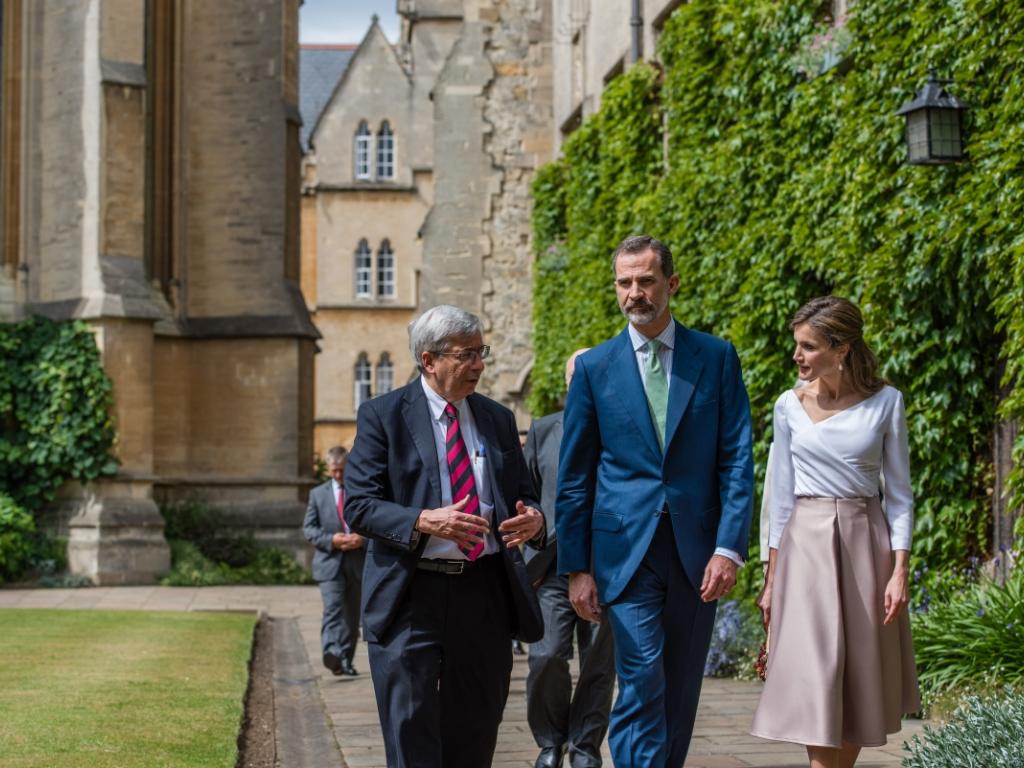Last Friday, 14th July 2017, His Majesty King Felipe VI of Spain and Her Majesty Queen Letizia visited Oxford to see the University’s close academic and cultural links with Spain. Their Majesties were in Oxford as they undertook the final engagement of their State Visit to the United Kingdom.
Oxford University is a major centre for teaching and research on the Spanish language and all aspects of Spanish studies. Spanish has been taught at Oxford for more than a hundred years and the University has played a leading role in creating the high international reputation currently enjoyed by British scholarship on the Hispanic world.
The University is home to almost 170 academic staff from Spain and there are currently around the same number of Spanish students reading for undergraduate and postgraduate degrees.

Their Majesties began their visit at the recently-refurbished Weston Library, where librarians from the Bodleian Library’s Special Collections team presented a selection of treasures from the Library’s collections, among them the Ulm Ptolemy, a woodcut map of the world which dates from the 15th century and contains the first printed modern map of Spain, which was presented to Francesco Capello, Venetian Ambassador to Spain, by King Ferdinand and Queen Isabella in 1492.
Also on display was a very rare first edition of Cervantes’ Don Quixote, one of the Bodleian’s four copies of the 17 surviving engrossments of Magna Carta, and the Codex Mendoza, which was commissioned by Antonio de Mendoza, the first Viceroy of Mexico (1535-1550), for presentation to the Emperor Charles V of Spain.
The manuscript contains a copy of a lost chronicle of the Aztec lords of Tenochtitlan; a copy of the ancient Tribute Roll, listing 400 towns paying annual dues to the last Aztec Emperor Moctezuma II; and an account of Aztec life ‘from year to year’.
Following a lunch in their honour at the 15th century Divinity School, the royal visitors attended a reception at Exeter College for Spanish students and staff at Oxford and members of the University who are studying, researching and teaching on Spain.
As the home of the King Alfonso XIII Professorship of Spanish Studies, which is this year celebrating its 90th anniversary, Exeter College is at the forefront of Spanish research and teaching in the United Kingdom and has a long-standing association with Spain.

The King Alfonso XIII Professorship was founded in 1927 ‘with the object of promoting friendly and sympathetic relations with the Spanish-speaking countries’ and is named after King Felipe’s great-grandfather in commemoration of His State Visit to the United Kingdom in 1926.
The Chair was first held by Salvador de Madariaga, the renowned Spanish writer and statesman, who went on to become President of the League of Nations and a leading pioneer of European integration.
Many famous Spanish writers, including Jorge Guillén, Dámaso Alonso, José Angel Valente, Francisco Brines, Félix de Azúa and Javier Marías, have also taught at Oxford.
King Felipe VI’s mother, Queen Sofía, has been an Honorary Fellow of the College since 1987 and the college is home to a Fellowship in Spanish literature named in her honour. Their Majesties viewed a portrait of Queen Sofía which hangs in the Rector’s Lodgings.
Professor Sir Rick Trainor, Rector of Exeter College, said: ‘As the home to a great deal of academic activity relating to Spain, Exeter College was delighted to host a reception for their Majesties.
Since 1927 Exeter has hosted the University’s established chair in Spanish, the King Alfonso XIII Professorship of Spanish Studies, currently held by Professor Edwin Williamson. In addition, for many years Exeter’s undergraduate and graduate students in Spanish have also benefitted from the Exeter-based Queen Sofia Fellowship in Spanish and, from the next academic year there will also be an Exeter-based Fellowship in Iberian History.
'All of these posts contribute to the study of Spanish subjects in the University more generally. As Exeter also has Spanish nationals among its employees, the College was honoured to welcome the King and Queen.’

At the lunch, the Chancellor of the University, Lord Patten of Barnes, said it was a ‘pleasure and honour’ to welcome the King and Queen to Oxford and spoke about the importance of the University’s links with Spain through its teaching and research and the presence of Spanish students and staff in Oxford.
He described the relationship between Oxford and Spain as ‘hugely important’, and said that whatever happens in the next few years, Oxford University must ‘retain the closest possible links with Europe and with European culture’.
King Felipe spoke about the importance of academic links between Spain and the UK, and international academic links more generally. He paid tribute to Oxford University’s contribution not just to the UK, but to the world.
‘All of us have benefited from the scientists, scholars and writers who were aware that spearheading knowledge means expanding the horizon for humankind,’ he said.
‘With its unique blend of vanguard and tradition, Oxford is, indeed, not only an admirable British university, but one of the institutions that have contributed to shaping the heart and soul of Europe and what we now call the West.
‘Oxford is the alma mater of countless British statesmen and scholars, and was also home to the wisdom of world-renowned Spaniards such as Luis Vives and Blanco White.
‘This university has advanced and spread science and knowledge, in a fruitful dialogue with the world’s scientific communities, such as Bologna, La Sorbonne, Coimbra and Salamanca, whose 800th anniversary we will commemorate next year.’
He went on to say that internationalisation is ‘woven into the very DNA of universities’.
‘This concept [of internationalisation] arises, precisely, from the fact that knowledge and science have always been global. Today more than ever.
‘After all, the very name ‘university’ refers to that universal dimension, both for the areas of knowledge it must encompass, and for its geographic, linguistic and cultural representation.’
He said universities must strive to attract the top talent. ‘However it may be achieved, whether with cutting-edge technologies or at the matchless setting of these Colleges and Halls, attracting talent will, in turn, be the best way for the University to garner further prestige and to help its mission flourish.
‘Because if there is a lesson to be learned from historic universities such as Oxford, it is that their global nature has a direct impact on improving the standard of living of our citizens and on the progress of our societies.’
Photos © John Cairns
